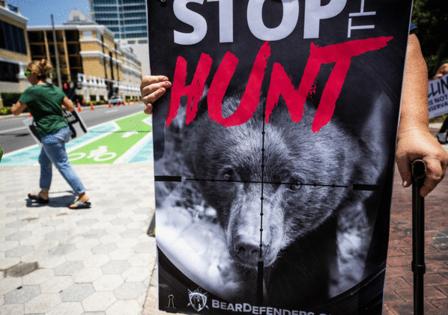Dozens of Florida bear hunt permits snagged by non-hunters
Published in News & Features
ORLANDO, Fla. — Most of the special permits to hunt Florida black bears in December have been claimed, a state wildlife spokesperson said this week, but more than three dozen are reportedly in the hands of hunt opponents, which may offer a reprieve to an equal number of bears.
The permits were distributed through a random lottery which cost $5 per entry. More than 160,000 entries were submitted, with application numbers bolstered by a vigorous effort from conservationists to undermine the planned 172-bear harvest, the state’s first in a decade.
Shannon Knowles, a spokesperson for the state Fish & Wildlife Conservation Commission, said 148 applicants who were notified last week of their selection have paid the bear permit fee — $100 for Florida residents, $300 for non-residents — to participate in the 23-day event. Each bear “tag” entitles the holder to kill a single bear.
Two dozen of the 172 tags remain unclaimed but could be assigned through the lottery over the next 10 days.
At least 39 permit-winners are unlikely to hunt because they entered the lottery to reduce the chances that bonafide hunters would win a tag entitling them to “take” or “harvest” a bear, terms Fish & Wildlife uses for killing a bear, according to Steve Rosen, who said he paid for hundreds of lottery entries.
“There are probably others that filed on their own and won permits but I am not aware of them,” he said in an email.
The strategy was led by the 240,000-member Sierra Club Florida Chapter which urged supporters “bag a tag, spare a bear.”
Rosen, a South Florida businessman who describes himself as a “rescuer,” said he spent more than $200,000 on the lottery to win a bear permit for himself and others partly because he believes years ago the state improperly delisted black bears as a threatened species.
The state’s black bear population had dwindled to a few hundred in the 1980s.
He successfully sued state authorities about 20 years ago, winning a decision that forced FWC to end its practice of permitting gopher tortoise “entombment,” where developers could win permission to bury the burrowing reptiles alive during construction projects.
A gopher tortoise is considered a “keystone species” with its long and deep burrows providing refuge for other animals.
Some bear hunt critics hope the “bag a tag” effort saves bear lives but they’ve urged their members to stay mum.
Chuck O’Neal, who heads the Seminole County-based conservation group, Speak Up Wekiva, said he was concerned FWC would increase kill quotas this year or in future bear hunts for every “sequestered” permit the agency believes was won by a non-hunter.
“But I know there are people who have gotten tags who don’t intend to shoot or take a bear other than its picture,” he said.
Susannah Randolph, state director of the Sierra Club, shares O’Neal’s concern. “Based on the fact that FWC and its staff has ignored science, dismissed the public, and pandered to trophy hunters, we simply don’t trust the FWC anymore to act in good faith with information provided to them,” she said.
Knowles, the Fish & Wildlife spokesperson, and George Warthen, the agency’s chief conservation officer, said the harvest quotas are based on data and science and consider a number of factors. Both said the agency has no plan to increase the quota for this year’s hunt, regardless of whether the tags are used.
State wildlife authorities said they could not yet say how many permits were claimed in each of Florida’s bear management hunting zone.
The agency divides the state in seven bear management areas but only four have a bear population of 200 or more animals, the threshhold FWC set for allowing a hunt in a region. About 4,000 bears roam the state, according to the wildlife agency’s estimates.
Only 18 of the 172 permits were designated for hunting in the central bear management area, a region including Lake, Orange, Seminole and Volusia counties. Central Florida has the most bears, about 1,200, but many are hit and killed every year crossing roads.
_____
©2025 Orlando Sentinel. Visit orlandosentinel.com. Distributed by Tribune Content Agency, LLC.







Comments